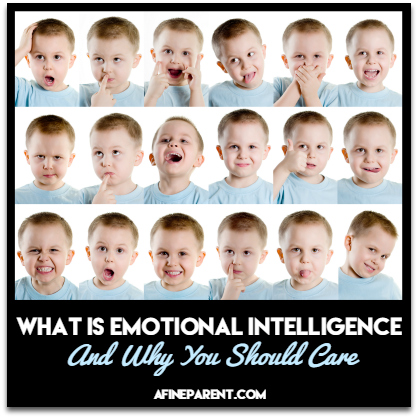 It’s there on your bucket list of great parenting – to raise a well-adjusted, successful child who will maximize his potential and flourish as an adult.
It’s there on your bucket list of great parenting – to raise a well-adjusted, successful child who will maximize his potential and flourish as an adult.
But how do you do that? What experiences can you give your child now to help prepare him for a world that grows increasingly complex each day?
Schools push standardized tests and curricula based around STEM (Science, Technology, Engineering and Math) or Common Core, but future success is not just about best educational practices.
The latest research indicates that the more likely predictors of future success include not just cognitive learning factors but social and emotional learning tool, starting in preschool through post-secondary education.
In other words, it’s not just about IQ, But EQ – their Emotional Intelligence Quotient – as well.
But Really, What is Emotional Intelligence?
Emotional intelligence is defined as our ability to identify, understand, utilize and manage our emotions appropriately to communicate effectively, problem solve, reduce stress and empathize with others.
Emotional Intelligence, or EI, provides us with the tools to interact in society in a positive and emotionally healthy manner.
 Emotional Intelligence can be seen as a combination of four main attributes:
Emotional Intelligence can be seen as a combination of four main attributes:
- Self-awareness: The ability to identify emotions in oneself and recognize how they affect thought and behavior. For example, if you are shopping with your child and she sees a toy that she wants and you tell her that she can put it on her wish list instead, you want your child to be able to recognize that she is disappointed and upset which may be resulting in her wanting to lash out inappropriately.
- Self-management: The capacity to control behavior resulting from emotions in appropriate and productive ways. Using the same scenario as above, once your child recognizes that she is disappointed because you won’t buy the toy, you want her to be able to manage her behavior appropriately instead of having a meltdown.
- Social Awareness & Interpersonal Intelligence: The ability to perceive and understand the emotional needs of others based on both verbal and non-verbal cues and the capacity to empathize and recognize social hierarchy. In other words, your child should be able to enter a social situation–playground, classroom, party–and be able to recognize common emotions in another child based on non-verbal clues and determine whether or not that child is inviting interaction or trying to avoid it.
- Social Responsibility & Relationship Management: Ability to communicate effectively, interact with others in an emotionally appropriate manner. Translation: A well-behaved child who interacts appropriately with others under various circumstances.
The Importance of Emotional Intelligence: A Real-Life Story
 I witnessed the importance of emotional intelligence a few years ago while running an after-school homework center for elementary school students.
I witnessed the importance of emotional intelligence a few years ago while running an after-school homework center for elementary school students.
One of my more challenging charges was a third grader named Jenna*. She was a special needs student, but her learning disabilities were non-specific and her deficiencies ambiguous. She struggled academically and her learning patterns wavered. She had poor retention and weak comprehension skills.
Her parents and teachers were frustrated and despite my experience in special education, I remained baffled as all my learning tricks failed to produce a lasting result.
But I began to notice something about Jenna that gave me a clue as to how she perceived the world; she had a finely tuned sense of emotional acuity. Her empathy level was high, and she was able to pick up on the emotional cues of others at a level well beyond her years.
It was a strength that served her well socially; could it be used to reinforce her academic deficiencies as well? How could I augment her social and emotional learning to help her make sense of her academic world?
I used three simple strategies to help strengthen her emotional intelligence muscle: identification, management, and reflection.
Each day during my program she and I would identify what she was feeling: take her “emotional temperature”. I helped her to recognize patterns and triggers and we established non-verbal cues such as eye contact, head nodding, or me pointing to a specific item such as the clock, to help her re-focus and remain on task.
She used these prompts to manage her behavior in response to her emotional state.
At the end of each day, we would reflect on her emotions and behaviors and before long she became very adept at honest self-appraisal.
She developed confidence in herself, and she began to recognize her own strengths and weaknesses. Slowly but surely, her academic performance also improved. Jenna added tools to her life skills toolbox that she continues to use today.
Why it is Important to Foster Emotional Intelligence in Children
 Emotions are what connect us. Providing your child with a healthy skill set for social and emotional learning is as essential as giving them nourishing food.
Emotions are what connect us. Providing your child with a healthy skill set for social and emotional learning is as essential as giving them nourishing food.
The great thing about emotional intelligence is that it can make a parent’s job easier! Think about it: great parenting depends on optimal communication and emotions are an essential part.
High EQ makes children better able to learn, problem solve and develop positive social relationships. Parents also get the benefit of “on the job training” by being able to examine their own level of emotional intelligence and discard dysfunctional behaviors in favor of more appropriate ones that they need to model for their children.
Cultivating emotional intelligence is a family effort that results in noticeable positive outcomes.
- Social Growth and Development: A child with a well-developed sense of emotional intelligence will be better able to navigate the social complexities of the world. Today’s children are growing up in a tech-heavy world. Interacting with social media is not equivalent to live, social interaction and the greater the dependence on technology, the less time that is spent interacting with others. Parents and educators need to construct a proper balance for children between time spent on technological pursuits and time spent interacting with their peers and adults.
- Academic Success: One of the components of enhanced EQ is being able to manage or control behavior that results from emotions. This presents a choice for your child: the ability to choose a desired behavior over a less desirable one. Choice gives a child a sense of control over his world which ultimately results in increased confidence levels. This sense of confidence leads to greater academic success as the child continues to experience mastery and proficiency resulting from his positive choices.
- Improved Family Dynamics: Why is it that a child who exhibits model behavior in the classroom is often “difficult” at home? Children behave according to the expectations that we have of them. Increasing their self-awareness regarding their thoughts, feelings and behavior leads to a greater sense of self-management and social awareness. A child who is tasked with his own emotional management will be less likely to exhibit behavioral problems on a regular basis.
- Physical and Emotional Health: Childhood in not stress free. Children are being asked to navigate an increasingly complex world where the rules change continually. Stress takes a physical toll on health and well-being and unchecked stress can affect immune health, blood pressure, anxiety levels and depression. Cultivating emotional intelligence can help children develop a healthy sense of self and purpose. As confidence levels rise, so does resilience. Children are less prone to free-floating anxiety and frustration and are more likely to establish healthy relationships with others.
Ways to Cultivate Emotional Intelligence in Children
 So what can we parents do to teach our kids emotional intelligence? Here are a few things to consider:
So what can we parents do to teach our kids emotional intelligence? Here are a few things to consider:
#1 Acknowledge the Feeling: Let your child know that you recognize that she is feeling frustrated, distracted, angry or sad. Don’t judge, just identify. Sometimes this is all a child needs to help her process through the emotion. It will also help her to recognize the feeling again when it resurfaces in the future.
#2 Identify the Emotion: Give your child words to help anchor the feeling to an identifiable name. You can start with simple feelings with young children like happy, then move to more complex emotions like disappointed, frustrated and betrayed as your child ages.
# 3 Be Present: This is a hard one. In our multi-task-oriented world, it has become increasingly difficult to be fully present with another individual. Yet, this single concept is crucial to fostering a capacity for emotional intelligence. Being present means that our total focus is on one thing – the other person. No talking to your son while you are checking email, no trying to have a quality conversation with your daughter while grocery shopping. These conversations are fine, but they should not supplant quality time set aside each day just to focus on genuine communication. This, more than any other tool, will make the greatest difference. Reading proved a great way to “be present” while working with Jenna. The story provided a focus for both her and I to attend to and allowed for discussion about what the characters were experiencing emotionally.
#4 Role Play: During a time when your child is having the most difficulty processing an emotion–anger, loss, frustration–or is unable to empathize with the emotions of others, offer to roleplay by acting his part and requiring him to respond as the other party. Roleplaying encourages empathy and it is often the quickest way to diffuse a volatile situation. Be aware not to judge. Conclude by asking your child what he noticed from the exercise. Did his perspective of the situation change? Is he less angry, frustrated, lonely?
#5 Creative Development and Problem Solving: Helicopter parents beware—back away from rushing in to rescue your child from problems. Let him figure it out for himself. Creative exploration and problem solving allows children to develop mastery over their world. They experience the sense of “process” and begin to formulate a solid level of confidence and an intrinsic self-management system. Creative problem solving gives children a way to measure their emotional responses to challenging situations. Encourage your child to brainstorm many solutions to help build resilience and flexibility.
#6 Foster Empathy: One of the best ways to foster empathy in children is through the use of animals. Children have a natural affinity towards animals and, thanks to the world of animation, can assign human attributes to them. A pet can allow a child to observe behaviors that the animal may be using to communicate its needs. This is a great way for children to begin to observe and understand non-verbal communication clues.
My dog was an integral part of my afterschool program. The students became experts at interpreting his non-verbal communication. Jenna, in particular, demonstrated such an understanding of him that her parents eventually bought her a dog of her own.
The 2-Minute Action Plan for Fine Parents
Commit to spending just 2 minutes today with your kids in observation mode. Identify the emotions and take note of your kids’ behavior.
- Does their behavior correspond to their current emotional state or is the behavior masking an underlying emotion that needs to be acknowledged?
- What patterns do you notice?
- Does your son throw a tantrum when he feels frustrated, or does he shut down?
- Does your daughter break down in tears when she is afraid, or does she lash out?
Learning how to differentiate behavior from emotion is key to helping your child cultivate a well-developed emotional intelligence.
The Ongoing Action Plan for Fine Parents
Over the course of the next week, take inventory of your own emotional barometer.
- How do your emotions manifest in behaviors?
- Are they healthy or self-destructive?
- What patterns do you notice?
- What messages are you presenting to your children?
- Do your emotions/behaviors trigger emotional responses in other family members?
- What old behaviors can you discard in favor of new ones that improve your interpersonal skills and help manage your emotions more effectively?
- How can you use some of the techniques and strategies outlined here for your children to advance the development of your own emotional intelligence?
Emotional Intelligence is a fluid skill that we can continue to enhance throughout our lives. Our intellectual intelligence aids in our quest for academic achievement and scholastic success, but our emotional intelligence is what allows us to manage the stresses, interactions and social complexities of our ever-changing global marketplace.
What better gift can we give our children than the ability to enjoy a greater sense of life satisfaction?
By teaching them what is emotional intelligence and how they can organize/regulate their emotions, we can make sure they are better equipped to navigate the complex world which lies before them.
*Name has been changed to protect the identity of the student.
Dear Ms. Barbella
Your writing is wonderful, I first read your story in Chicken Soup for the Soul, Miraculous Messages from Heaven. I was drawn to your story, especially about the irises…I have buried 2 of my boys and one Grandson, all under the age of 21. Irises have always been the flower of choice that was left with them when cremated. And they constantly show up unexpectedly as my life continues on.
It has been a tough journey, but I believe and have faith. I am in the process of writing my own story and children’s books that I would love to share with the world. I would love to have a conversation with you if you have the time…
I currently live on Vancouver island in B.C. with my partner and we own/run a tree planting company. My email address is ivyracer9@gmail.com and my name is Pam.
Thank you so much for your stories, I hope to hear back from you…
Yes; it’s an urgent duty to foster emotional intelligence…but the problem is that, many parents who are not brilliant in math, can advise their children to work math to be brilliant;
But parents with no emotional intelligence would hardly think about the subject…!
So in this case, you need to advice the parents first…
Nice article…thanks…
@chems luc, good point. Honestly, I didn’t know much about emotional intelligence until fairly recently either. So, I agree that parents need to be aware of emotional intelligence first before we can teach it to our children. Hopefully this article is one small step in the right direction in increasing awareness. 🙂
Thank you very much for sharing this. This is one of the important things that we really need to work on as a family, with two strong willed boys. Hopefully, we can all come out at the other side with a (re-newed) us. This is also an important thing I and my husband have to work on ourselves. We have been in a difficult journey these past few years, but I am striving to not giving up, although it is at times very difficult. I hope, with this understanding, one of our problems can be solved and we can start to tackle other areas also in our family dynamics. Thanks for this.
Josephine, your journey ahead sounds like a difficult one, but then, things worth having are worth fighting for. Good luck to you. I sincerely hope you will find that things will resolve into something a lot more peaceful as you go along.
And, I appreciate your kind words about the article — Thanks.
I found plenty to take home from the article. Thanks for sharing it. I have read John Gottman’s ‘How to raise an emotionally intelligent child’ as well as his book on the 7 principles of a successful marriage. Practical and yet in-depth. Plenty of substance without being verbose. I highly recommend it..
Thanks for the kind words and the recommendation, Preeti. I will bump up Gottman’s book in my “to read” list 🙂
Thanks for this article. It reminded me how poor my own EI is, particularly the part about appropriately managing my emotions. I have read most of The Happiness Trap by Russ Harris, which I feel is dealing with similar issues, but I really struggle with following through on all of the techniques I read about. I have now been reminded of how I could have better dealt with tonight’s back to back meltdowns from my 3 1/2 yo. I am looking forward to more tips and suggestions in the next few weeks.
I’m with you, Cathy! I started out with holding my emotions on my sleeve and being totally run by them. Starting this site has made a huge difference in how I deal with it these days though… I hadn’t really thought of this journey in terms of improving my “emotional intelligence”, but I now realize now that’s been a big part of it!
If this article has been helpful, please do stay tuned. I have some wonderful articles with very practical tips and relatable stories shaping up for the next few weeks. Also, FWIW, please don’t be too harsh on yourself about the emotions, or how you could have handled any past event — I’ve noticed that just being aware helps me handle future situations better. I am not always successful in responding ideally, but it is definitely an improvement over how I used to respond before. “Progress, not perfection” — works for me 🙂
Cultivating Emotional Intelligence by being present (#3) is on point.
I work from home and homeschool. Just this morning I asked my 12-year-old son’s forgiveness because I was sharp with him yesterday when he came and asked me for help with his Pre-Algebra work. I was working against a deadline, and I had already been interrupted multiple times. It wasn’t my best hour, but I asked forgiveness because he deserved that respect from me.
I’ve always made it a goal to be interruptible during our “school” hours – always. So, basically I was splitting my focus in half and he knew it, and I knew it.
One thing that works for us: When we go out to eat for family dinners everyone leaves their phone on the counter in the kitchen and we DRIVE AWAY as a family.
We are 100% there through the dinner together. No one is checking Instagram, email, or Vine. It is a committed family time.
It makes a difference, but as was pointed out in this article, as parents we have to model what we want to instill.
Wow, all of you leaving the phone on the counter at home when you go out for dinner is quite something, Heather! Isn’t it a little extreme though? What if you have an emergency and need a phone? (I don’t mean to be judgmental – just really very curious…)
Don’t worry, Sumitha. I don’t think your comment is judgmental.
I do think it is a matter of perspective.
My husband and I are 43-years-old. We grew up in a time where a mobile phone, when anyone had them, looked like walkie talkies attached to very large battery pack “purses.”
We bought our first cell phones in 2004. Before that, we never were “accessible” when away from home. In our minds, cell phones are a convenience, not a necessity.
Our kid are 18, 15 and 12. Our 12-year-old is the only one without a cell phone. No one minds going without cell phones on the nights we go out because time is sweet. We have, at times, wanted to Google something we were talking about or wished we could refer to a photo on one of our phones, but for the most part, it isn’t something we think about.
If there was something going on – a parent or friend ill and possibly needing our help, we would probably take one phone.
I just think our society has turned the convenience of having a cell phone into the burden of being available 100% of the time. Sometimes we just want to be unavailable to everyone but us.
Wow, that’s really impressive. I can remember the time when we didn’t have cell phones, but somehow can’t imagine going out without one now…. I used to think that I am less of a phone addict than the people I’m surrounded with, but after reading your comment, I question that… strongly 🙂
Thank you so much for sharing that perspective. It has really given me a lot to think about!
Wonderful article – and bang on with your suggestions for parents. As parents, and now grandparents, we have seen the value of understanding EI in the family. As an educator for over 35 years, I have seen the value of EI in the institutional setting. And now, as co-authors of a book on parenting (based on temperament), we clearly see the connection between EI and temperament.
Thank you so much for sharing that, Wayne. To me, starting to think of my role as a parent in terms of “emotional intelligence” is still rather novel, so I appreciate your testimonial based on so many years of experience!
As a father of a very strong willed 3 year old (almost 4), I can see how this is a huge part of my duty as a parent. However, I feel this article is just a trailer for feature length film journey I need to embark on. After reading this, I realized that I need more emotional intelligence and maturity as a 38 year old entrepreneur in order to be successful as a father, husband and business leader. I adore Ms. Barbella’s article, however, the techniques here feel a bit vague to me. I see what to look for but not necessarily how to treat or help my child and, in essence, myself. Do you know where I can find additional resources to begin this process? Thinking about it, I feel like my whole family’s course can be altered for the better for generations. Thank you!
Agree, Chris! That’s one of my struggles as well – we can’t teach our kids what we haven’t mastered, or at the very least figured out, yet. I’ve heard a lot about the book “Raising an emotionally intelligent child” by John Gottman. I haven’t read it yet, but it’s on my to-read list. Check it out if you’re interested.
Also, this article is an introduction to the topic of “emotional intelligence” and we will be looking in depth at the topic over the next 4-6 weeks. I am working with wonderful writers (from within our community!) on articles related to EI that cover techniques like active listening, and resources about how to respond best to emotional meltdowns, behaviors that pushes our buttons etc. If you haven’t yet, please do sign up to receive a notification directly in your mailbox when these articles are published.
Hi Chris. I am glad that you found the article inspiring enough to seek more information! You can research Daniel Goleman- he was the pioneer who first proposed the importance of Emotional Intelligence. There are many fine articles and plenty of information as Smitha has indicated. Best to you and remember that we are all works in progress, learning refining and sharing our skills along the way!
This is a wonderful article – love that it’s not just theory but includes practical tips for how to take this knowledge into the real world. That Barbella chose a little girl who has challenges in the classroom to illustrate her points about EL drives home the fact that anyone, regardless of how old they are, can use this information to for positive self-growth. Definite share-worthy post.
Thank you so much for your kind words, Kathy! I totally agree with you that regardless of how old we are, anyone can use this article to spur positive self-growth. I see so many subtle ways I’ve been applying it in my own life since reading this article the first time — for instance when my daughter startled me yesterday and I snapped at her, I took a moment to acknowledge my current emotions and those that were triggered in her when I snapped. And it helped tremendously to move past shame/guilt and regulate what came next, and things slowly started to turn for the better. Awareness makes a huge difference!